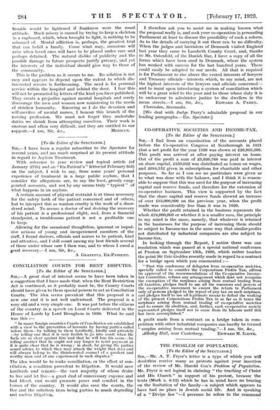CO-OPERATIVE SOCIETIES AND INCOME-TAX. [To the Editor of the SPECTATOR.]
SIR,—I find from an examination of the accounts placed before the Co-operative Congress at Scarborough in 1921 that a net profit for the year 1920 was shown at £26,993,396. This profit was arrived at after paying interest on loans.
Out of the profit a sum of £3,636,768 was paid in interest on share capital, £250,022 was distributed as bonus on wages, and £684,152 given in subscriptions for charitable and other purposes. So far as I can see no particulars were given as to what was done with the balance, and I think it is reason- able to suppose that this was used for the purpose of increasing capital and reserve funds, and .therefore for the extension of co-operative business. This -view is supported by the fact that the share capital and reserve funds showed an increase of over £18,000,000 on the previous year, when the profit made was considerably less than it was in 1920.
Whether the profit retained in the business represents the whole £24,000,000 or whether it is a smaller sum, the principle to my mind is the same, namely, that whatever is retained in the businesses for the purpose of increasing them should be subject to Income-tax in the same way that similar profits not distributed by industrial companies are also subject to Income-tax.
In looking through the Report, I notice there was one resolution which was passed at a special national conference at Preston on September 15th, 1920, which rather touches the point Sit Eric Geddes recently made in regard to a contract for a bridge upon which you commented :-
" That this conference of delegates from co-operative societies, specially called to consider the Corporations Profits Tax, affirm; its approval of the recommendations of the Co-operative Income- tax Committee, refuses any arrangement which does not recognize the exemption of the surpluses arising from mutual trading from all taxation, pledges itself to use all the resources and powers of the co-operative movement to ensure the return to Parliament only ofpersons pledged to the repeal of any tax on such surpluses, and pledges itself to use all legitimate means to defeat the working of the present Corporations Profits Tax in so far as it taxes the surpluses arising from mutual trading of co-operative societies and to ensure its abolition, and, further, each co-operative society represented pledges itself not to cease from its "labours until this has been accomplished."
A profit made from a contract on a bridge taken in com- petition with other industrial companies can hardly be termed " surplus arising from mutual trading."—I am, Sir, &c.,
Allesley Hall, near Canterbury. Enwsan M. ILIFFE.










































 Previous page
Previous page